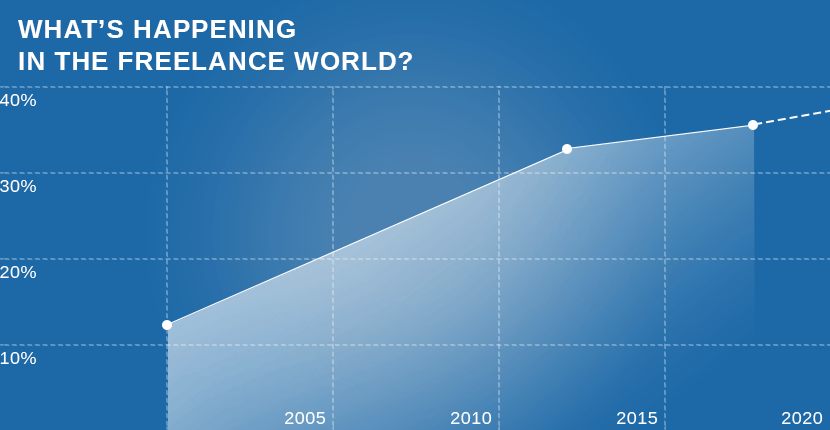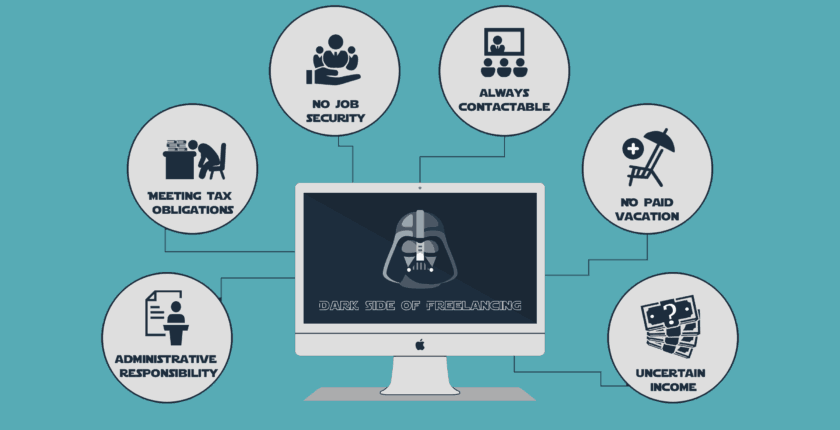Your Cheat Sheet to Becoming a Successful Freelancer
The freelance life is challenging, but it can be very rewarding and enjoyable. We’ve compiled this comprehensive guide to help you become a successful freelancer. Read on to learn all you need to know about finding work, pricing, managing, and building a freelance business. Chapter 1: Finding a Freelance Job Freelancers can find clients in all sorts of places, but one of the best options is through online freelance platforms. Recent data shows that this is how 75% of freelancers find work. Freelance platforms are online marketplaces where freelancers can showcase their skills, share their portfolio, and outline their rates. Clients know that they’ll find plenty of freelancers on these sites, so it’s usually the first port of call for businesses to browse talent and find the right person to work on their next project. Determine which freelance platform (or platforms) is the best for you! Chapter 2: How to Create a Winning Freelance Profile A fantastic profile stops clients in their tracks for a second look. That’s the type of profile you want. Your profile on a freelance hiring platform is your storefront, business card, and public face. Clients who have never worked with you before only have your profile to guide them on whether or not they should hire you. Find out how to avoid the pitfalls of a bad profile and create one that gets every potential client clicking! Chapter 3: How to Price Your Freelance Work Without question, the most frequently asked question posed by every freelancer is always “How much should I charge?” Pricing your work on Upwork, Freelancer, or any other platform means walking a very fine line. On the one hand, you’re scared that if you ask for too much money, the client will take their business elsewhere. On the other hand, you certainly don’t want to charge less than you deserve. You’re providing a valuable service, and you should be compensated for your skills, experience, and time. So, how do you make this calculation? We provide you with the tools you need to make this all-too-important decision. Chapter 4: How to Book a Freelance Job When you’re just starting out as a freelancer, your biggest worry is finding work. You might feel ready to say “yes” to every project that comes along, so you don’t have to spend weeks and months with no work to do. The risk is that you’ll end up saying ‘yes’ to the wrong jobs. Learn which jobs to say “no” to, tips for writing a winning proposal and landing your first job, as well as the pros and cons of going with short-term versus long-term projects. Chapter 5: How to Discuss a Freelance Project with Your Client Before You Start Hooray! The client liked your proposal and got in touch to ask for more details. You’re in that tricky stage now between proposal and contract, where you need to understand what the client wants and effectively communicate your requirements. Understand what you need to know before you sign on the dotted line, including deadlines, scope of work, and of course, payment terms. Chapter 6: How to Navigate the Freelance – Client Relationship One of the primary skills you’ll need to gain as a freelancer is managing your clients’ expectations. Doing this successfully requires starting on the right foot by presenting your client with a clear contract. Find out how to meet (and exceed) client expectations, build a strong client-freelancer relationship, and how to navigate various issues without it affecting your working relationship. And don’t forget, every type of client is different – we give you a few tips on how to handle different kinds of clients. Chapter 7: How to Manage Your Time as a Freelancer for Maximum Productivity Every freelancer is tempted to believe they can fit their work around the rest of their life. This approach could lead to trouble. To succeed as a freelancer, you will need to schedule your work time just as if you worked in an office. It’s important to treat your work seriously, so schedule your work for your most productive time of day. Learn all the tips and tricks to managing all your clients within reasonable hours, including juggling multiple projects, recommended time-tracking and automation software, and, of course, how to maximize your productivity. Chapter 8: How to Get Paid as a Freelancer Once you’ve completed your work, the next step is getting paid. Hopefully, you’ll have an appreciative client who pays promptly. First and foremost, you need to choose the best payment option. We summarize the top payment options and help you decide which is best for you. Also discussed is how to receive international payments, fees, invoicing, and (unfortunately) what to do in cases of non-payment. Chapter 9: Managing Your Finances as a Freelancer – A Comprehensive Guide As a freelancer, managing your finances can be a lot more challenging than it used to be when you were a traditional employee. When you’re a freelancer, you can’t be certain how much you’ll make throughout the year. You also have to allow for your tax burden and benefits such as health and disability insurance, which aren’t shared by your employer. Chapter 10: How to Advance Your Freelance Career Being a freelancer can bring you a good income and the freedom to work according to your own schedule. Once you’re established as a freelancer, you might want to find ways to grow your income and advance your career. Read here to find ways to increase your earning potential and advance your career, including becoming an agency and “selling your experience” by teaching others. Chapter 11:How to Be a Freelancer and Keep Your Day Job Is it possible to have a full-time job and side business at the same time? The answer is yes. Absolutely. For sure. But it’s not easy. And it won’t happen overnight. It takes planning, determination, and persistence – but it’s very possible. And more and more freelancers are successfully juggling both. Our expert goes over the eight steps you need to take to get into freelancing while still maintaining your current job.What’s Happening in the Freelance World?
Freelancing is becoming more popular as an alternative to working as an employee of a single company. Freelancers often say that they enjoy the flexibility, prefer to be able to choose how much they work, and/or don’t want to be tied down to working at the same place long-term. Working with freelancers is a popular choice for businesses as well. The recent recession has forced many companies have been forced to downsize. While they can’t afford to hire full-time employees, they still need workers for regular, periodic, or occasional tasks. By hiring freelancers, companies have access to the skills they need without keeping extra permanent staff on the books. This trend of reducing the number of full-time employees has left many talented workers without a regular job. Freelancing not only gives them the option to do the work at which they excel, but also to work remotely for businesses that are far away from their own locale.These individuals are in good company, as the freelance market has continued to increase over the past several years.
– In 2005, 10.1 % of the U.S. population worked as freelancers at some point over the year.
– By 2014, that figure had risen to 34% of the workforce, or 53 million Americans.
– And in 2017, 36% of the American workforce—or 57.3 million people—did freelance work.
– By 2020, that number is expected to meet, and possibly exceed, 40%.

Ten years ago, there were very few websites that connected freelancers with clients. Today, freelancers can advertise their skills on popular global hiring platforms such Upwork, Fiverr, and Freelancer.com, or on industry-specific freelance sites such as 99Designs or EngineerBabu.
Why It’s Awesome to Be a Freelancer
Freelancing can be a very attractive lifestyle. Some of the advantages include:
- Being your own boss: You choose your hours, and you decide when to clock in and out.
- Freedom to work anywhere: When you’re a freelancer, you can work from home, your local coffee shop, or even the beach.
- Ability to choose your projects: Freelancing brings the option of choosing which projects interest you and which ones, well, don’t. You can work in the fields you enjoy and skip the ones you dislike.
- Work with people you like: When you work in an office, you don’t get to choose your colleagues or your superiors; as a freelancer, you can dismiss the nasty clients and hold on to the ones who are a pleasure to work for.
- A real sense of achievement: When you freelance, the amount you earn is directly connected to how much and how well you work; you won’t be wondering why you didn’t get a raise or feel that your manager got the credit for your hard work.
- Self-discipline: You’ll need to get your tasks done without being distracted by the beach, the game, or the dirty dishes in the sink.
- Good communication skills: It’s up to you to know how to ask for more guidance when you don’t understand the instructions; you’ll also need to be able to deal with difficult clients.
- Organization and time management: As a freelancer, you’ll need to keep all of your documents in order, stay on top of your tax obligations, and make sure that you meet your deadlines.
- Courage to put yourself out there: No one will know that you are a top-class developer, writer, or designer unless you promote your skills.
- The ability to multitask: Most freelancers juggle multiple projects at the same time, so you’ll have to prioritize your tasks and be able to switch between different topics in an instant.

The Dark Side of Freelancing
Although being a freelancer can bring you flexibility, control, and a great income, there are downsides as well. Some of the disadvantages of freelancing include:
- An uncertain income that can vary from month to month
- No paid vacation days, sick leaves, or benefits
- You always have to be contactable by your clients
- No job security; if work dries up, there’s no termination pay or option to sue for unfair dismissal
- You have to meet tax obligations without any employer withholdings
- Full responsibility for administrative tasks like accounting, invoicing, and chasing payments
- Find it difficult to take criticism: As a freelancer, you’ll need to be able to accept and respond to feedback that isn’t always positive.
- Have trouble communicating: Sometimes, you’ll have to take the initiative and approach clients for work; you’ll also occasionally need to admit that you’re struggling with a project and ask for more resources or guidance.
- Aren’t self-motivated: Without a manager keeping you on track, you’ll be in charge of your own work schedule; if you can’t stay on top of everything, you’ll quickly be swallowed up in the quicksand of deadlines.
- Don’t like working in isolation: If you need the buzz of a busy office and the social opportunities of the water cooler, you’ll soon get bored of working on your own.
- Can’t handle the uncertainty of not knowing when your next paycheck will arrive: If you get consumed by anxiety when you have a slow month, your nerves might not be able to handle freelancing.
Don’t Forget: Being a freelancer isn’t an all-or-nothing decision. Many freelancers begin by doing some freelance work alongside a regular part-time or full-time job, then slide into full-time freelancing. If you try freelancing and decide that it’s not for you, there’s no shame in returning to the world of regular employment.
What Freelancing Skills Are the Most In-Demand?
Freelancing is open to many different skill sets, but some are more in demand than others. Some of the most popular freelancing skills are:- Social media management: This is a vital skill for all types of businesses across all verticals; while the average hourly rate is $16, talented freelancers can charge $45 per hour or more in this field.
- IT programming and development: IT programming and developing is a popular choice for freelancers, and the average hourly salary for programmers and developers is $22.20. In this field, the rate you can charge depends on which programming languages you’ve mastered; a full-stack developer in the US charges an average of $55 per hour, while a web designer in the US charges an average of $25.
- SEO, content writing, and copywriting: The average hourly rate for content writers across the world is $16, which is relatively low compared to an IT programmer. But experienced and talented writers can earn up to $90/hour, and sometimes more.
- Graphic design: Talented graphic designers are needed for everything from product design to website creation. The average hourly pay for a designer is $20, but the range is wide. Graphic designers earn an average of $17 per hour, but top designers who can tap into multimedia and 3D design can command an hourly rate of $45 and above.
- User experience (UX/UI) design: A step beyond graphic design, a UX/UI designer pulls together the entire customer experience on a website or app; the average salary is $42 per hour.
- Business consulting: This involves advising businesses of all sizes on every aspect of improving their business; the average hourly rate of $35 is just the beginning.
- Information security: Analysts in this sector are much needed, given the high risk of cyber attacks; if you’re freelancing as an IT security analyst, you should be charging well over $40 per hour.
- Virtual assistants: As offices downsize, the demand for remote assistants to deal with standard administrative tasks is rising; virtual assistants charge an average of $11 per hour.
- Accounting: Freelancers and small businesses often turn to other freelancers to handle their tax and accounting needs; freelance accountants can earn a respectable average salary of $19 per hour, with financial analysts and business management accountants charging an average of $21 per hour.
- Photography and video editing: Demand for these jobs has grown by 19%-22% as high-quality images become more important for successful marketing; the average hourly rate for professional photographers begins at $75 per hour, with top photographers earning up to $500 or more per hour.
Be Careful: Although freelancing is an attractive way of life, it doesn’t suit every profession. Be realistic when you think about quitting your day job tomorrow to become a freelancer.
How Much Can I Earn as a Freelancer?
The amount you earn as a freelancer varies widely: all the way from $3 per hour to $100 or more. Overall, the amount that freelancers earn worldwide has dropped from an average of $21 per hour in 2015 to $19 per hour in 2018. However, the last few years saw a huge increase in freelancers from countries such as Bangladesh and Ukraine, where the cost of living is low. These workers can charge less and still earn well above the national average for their region. Here are some parameters that affect how much you can earn: Location. The average hourly rate in the U.S. is $40.17, while a comparable freelancer in the Philippines charges an average of $11.72 per hour. That’s partly because of the price employers expect to pay, partly because of the relative standard of living, and partly because of tax obligations. Experience. The more experience you have in your field, the more you can earn. A new freelance marketer earns around $16 per hour, but an average of $52 per hour after ten years of experience. Qualifications. It’s worth noting that additional educational qualifications hold less significance in the freelance realm. A Bachelor’s degree, in itself, does not result in a substantial salary increase. Instead, your expertise and portfolio carry far more importance. However, possessing a Ph.D. or a Master’s degree does lead to an increase in earnings. Industry. The main factor for how much you earn seems to be your industry. It’s no surprise that freelancers in the legal field charge more than double the hourly rate of administrative assistants.Avoid These New Freelancer Traps
No matter your field, there are some common traps that are waiting to make life difficult for new freelancers. Don’t make these newbie mistakes!- Don’t accept every project: Choose the ones that best suit your skills and interests so you can showcase your abilities and present yourself as an expert in certain projects.
- Don’t price too low, or too high: If you undercharge, you won’t be taken seriously, and if you charge way too much, your clients will go with someone who has more reasonable rates. You’ll have to do your research to find the right balance.
- Always follow up with a client: Ask if they have other, similar work for you to do or suggest a connected project that could help their business. Make a note to get in touch again after a few months to see if they need you for another project.
- Always get a signed contract: This is important to do before beginning to work on a project and should detail the obligations on both sides, including when and how much you will be paid. It might feel a little bit awkward at the beginning, but having a signed contract can save you so much time and aggravation further down the line.
- Delegate or automate time-consuming administrative work: Sending invoices, managing tax obligations and keeping on top of accounting is important, but it uses up valuable time that you could spend earning money.
- Create a routine: Don’t leave your work until you’ve got everything else out the way, or you’ll discover that you don’t have enough time. Manage your time carefully and schedule work for the time of day when you are the most productive.
- Don’t give up: Freelancing can be hard work at the beginning, but don’t give up – like everything else in life, it gets easier once you have a bit more experience.
Action Items:
- Decide which field(s) you want to dive into as a freelancer
- Consider whether or not you’ll be suited for the ups and downs of the freelance lifestyle
Feel free to share this article and/or copy this post or parts of it to your website, blog, or social networks. All we ask is that you attribute it to WebsitePlanet.com










